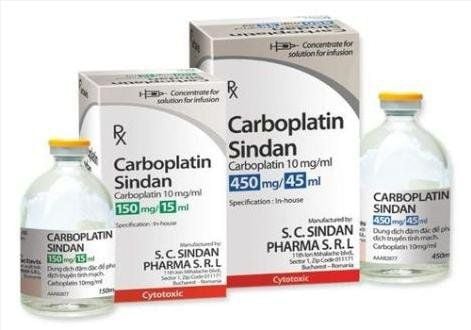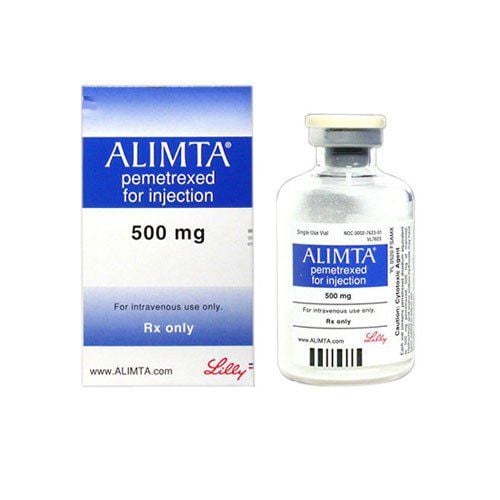This is an automatically translated article.
Melphalan belongs to the group of alkylating drugs, which are used to treat several common types of cancer, including cancers that are in the late stages of growth or rapidly growing.1. What is Melphalan?
Melphalan also known as Alkeran, alkylating agent, used as a chemotherapy drug to treat ovarian cancers, multiple myeloma, melanoma and amyloidosis AL, cancer breast, unresectable epithelial ovarian carcinoma, malignant melanoma, neuroblastoma, polycythemia vera. It works by slowing down or stopping the growth of cancer cells.
2. Dosage and usage of the drug
Melphalan can be used orally or intravenously, the dose will also change according to the purpose, route of administration as well as the patient's weight.
When using orally:
Patients should take the drug on an empty stomach to promote the most effective. When using injection:
Dissolve the drug powder with 0.9% sodium chloride solution and inject it directly into a vein. If you do not inject but use an infusion line, it will be infused within 1 hour 30 minutes. When used with a high dose of 100 - 200 mg/m2, patients need to use it in combination with other drugs or have a method to restore bone marrow after using Melphalan. For patients with multiple myeloma:
If used alone, the dose is 0.15 mg/kg/day used for 7 days or 4 days at a dose of 0.25 mg/kg/day . Then stop using the drug for 4 to 6 weeks so that the drug can be fully absorbed into the body and then continue the maintenance dose. Before each course of medication, the patient will have a blood count checked, if the neutrophil count is below 3000/mm3 or the platelet count is less than 100,000/mm3, the drug should not be continued. After white blood cell count and platelet count return, a maintenance dose of 2 mg/day may be used. In the case of combined use of Melphalan with Prednisolone, a dose of 20-40 mg / day will be applied, but this dose will not be maintained throughout the course of treatment, but the doctor will gradually reduce the dose of Prednisolone until stopping. drug use. For patients with adult myeloma:
In case of intravenous drug use: The doctor will prescribe a dose of about 16mg/m2. The drug is infused over 15 to 20 minutes with a frequency of 2 Once a week and 4 doses. In case of using oral drugs: The applied dose is 6mg, 1 time per day, after about 2 to 3 weeks of treatment. As the white blood cell and platelet counts increased, the dose was adjusted to remain at 2 mg per day. For patients with ovarian cancer:
The general regimen will be to use the drug dose of 0.2mg/kg orally daily for 5 days.
3. Possible interactions of the drug Melphalan
Some common side effects when using the drug such as:
Nausea and vomiting, diarrhea, mouth ulcers. In some cases of severe reactions, the doctor will prescribe more medicine to reduce nausea and vomiting. Bone marrow suppression includes: A decreased white blood cell count increases the risk of infection or a decreased platelet count increases the risk of bleeding. Lost memory . Less common side effects such as:
Hair loss. Interstitial pneumonia, pulmonary fibrosis. Itching, rash, vasculitis. Heart stop. Tell your doctor right away if you experience any serious reactions such as difficulty breathing, irregular or absent menstrual periods, liver problems such as abdominal pain, dark urine.
How to handle:
Before using Melphalan to treat a disease, doctors and patients will have to weigh the benefits and risks that the drug causes. When taking the drug, it is necessary to carefully monitor unwanted side effects. For patients with bone marrow disease or bone marrow damage caused by previous radiation therapy, chemotherapy, or slowly recovering bone marrow function, more special monitoring is needed for side effects. It is necessary to conduct tests on the number of white blood cells, platelets before and during the use of Melphalan, so that the amount of medicine can be adjusted accordingly. If the patient's body reacts hypersensitivity to the components of the drug, it is necessary to stop using Melphalan. In case the drug is injected outside the blood vessel, it is necessary to apply ice at the injection site or in the case of large doses of the drug that has been diffused in the tissue, which can reduce the absorption with sodium thiosulfate solution. Do not take Melphalan without the supervision of a doctor, the patient should be consulted if serious side effects occur such as weight loss, persistent cough, unusual tumor ...
4. Precautions while using Melphalan
Do not use Melphalan in patients who have received other myelosuppressive drugs or X-ray therapy within the previous 3 to 4 weeks. Be careful with patients with impaired kidney function or kidney stone disease, gout, because when using Melphalan will increase blood uric acid. When using Melphalan, absolutely follow the instructions of your doctor - who has expertise in the use of anti-cancer chemotherapy and understands its uses and possible side effects. In the case of intravenous drug use, it may increase the risk of tissue necrosis. The combination of Melphalan with nalidixic acid can lead to death, because the patient is prone to inflammation of the small intestine or bleeding in the colon. Using high doses of Melphalan with Ciclosporin is nephrotoxic, reducing kidney function. For pregnant women: It is not recommended to use the drug during pregnancy because it can harm the unborn baby. According to research, Melphalan causes embryonic death or leads to birth defects. The doctor needs to report the side effects of the drug before taking it so that the patient understands. For women who are breast-feeding: Currently, there is no research to prove that the drug can be excreted in breast milk, but because the drug has an adverse effect on the fetus, if before taking the drug, stop giving it to the baby. suck. Before use, you should tell your doctor if you have the following problems:
Allergy to any ingredient of the drug. Medicines that you are taking, whether prescription drugs, over-the-counter drugs, or dietary supplements. Have or have ever had a medical condition such as blood disease, kidney disease, or have received radiation treatment. Using Melphalan may make your body more susceptible to infection or make the infection worse. Therefore, sick people need to stay away from people who are suffering from contagious infections.
5. Overdosage and how to handle it
Using Melphalan drug doses higher than 290 mg / m2 will appear body reactions such as loss of consciousness, muscle paralysis, convulsions, violent vomiting. When using a dose of 50 mg/day for 16 days, reactions such as diarrhea and gastrointestinal bleeding may occur. A high dose of 199 mg/m2 will cause severe mucositis, gastrointestinal bleeding, increase the likelihood of hepatic vein occlusion, respiratory distress syndrome, and low blood sodium levels.
Treatment:
Need supportive anti-infective treatment to prevent complications by infusing blood products, using drugs to stimulate hematopoiesis in order to shorten the time of thrombocytopenia caused by Melphalan. Patients with overdose should be monitored for 3 to 6 weeks.
Above is some information about the use of Melphalan, if you need advice or have any questions, please consult a qualified doctor / pharmacist for answers.
Please dial HOTLINE for more information or register for an appointment HERE. Download MyVinmec app to make appointments faster and to manage your bookings easily.













